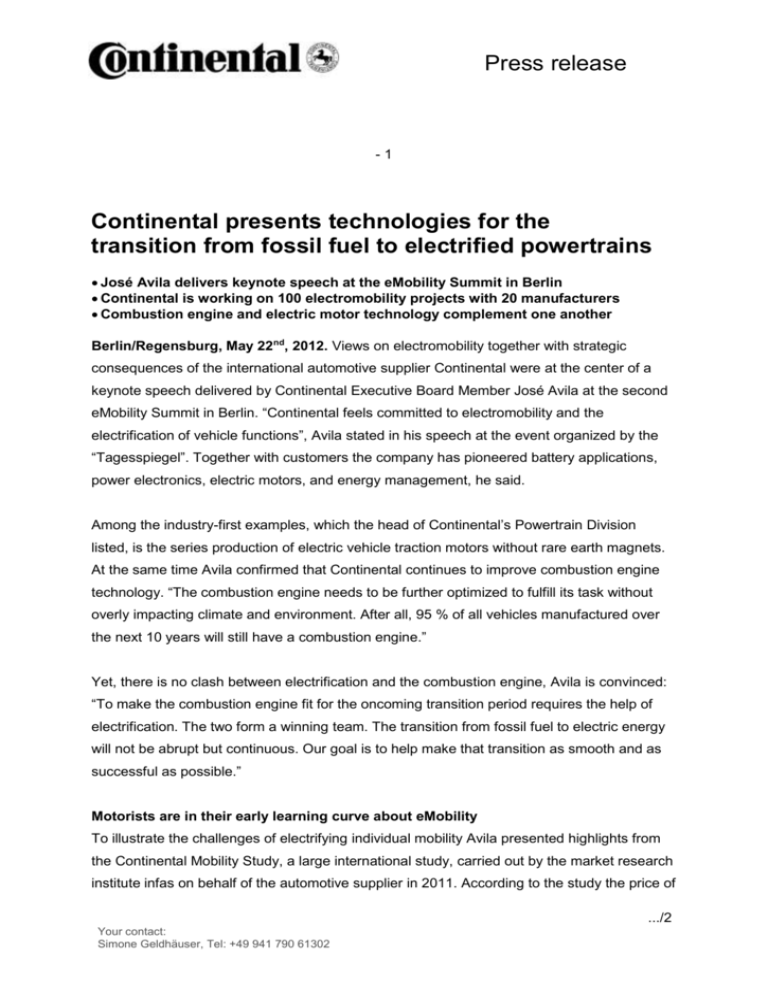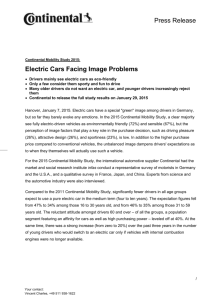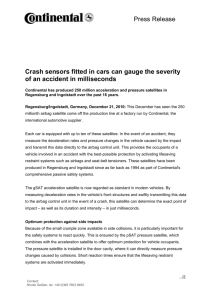José Avila delivers keynote speech at the eMobility Summit in Berlin
advertisement

Press release -1 Continental presents technologies for the transition from fossil fuel to electrified powertrains José Avila delivers keynote speech at the eMobility Summit in Berlin Continental is working on 100 electromobility projects with 20 manufacturers Combustion engine and electric motor technology complement one another Berlin/Regensburg, May 22nd, 2012. Views on electromobility together with strategic consequences of the international automotive supplier Continental were at the center of a keynote speech delivered by Continental Executive Board Member José Avila at the second eMobility Summit in Berlin. “Continental feels committed to electromobility and the electrification of vehicle functions”, Avila stated in his speech at the event organized by the “Tagesspiegel”. Together with customers the company has pioneered battery applications, power electronics, electric motors, and energy management, he said. Among the industry-first examples, which the head of Continental’s Powertrain Division listed, is the series production of electric vehicle traction motors without rare earth magnets. At the same time Avila confirmed that Continental continues to improve combustion engine technology. “The combustion engine needs to be further optimized to fulfill its task without overly impacting climate and environment. After all, 95 % of all vehicles manufactured over the next 10 years will still have a combustion engine.” Yet, there is no clash between electrification and the combustion engine, Avila is convinced: “To make the combustion engine fit for the oncoming transition period requires the help of electrification. The two form a winning team. The transition from fossil fuel to electric energy will not be abrupt but continuous. Our goal is to help make that transition as smooth and as successful as possible.” Motorists are in their early learning curve about eMobility To illustrate the challenges of electrifying individual mobility Avila presented highlights from the Continental Mobility Study, a large international study, carried out by the market research institute infas on behalf of the automotive supplier in 2011. According to the study the price of .../2 Your contact: Simone Geldhäuser, Tel: +49 941 790 61302 -2 e-vehicles is the biggest hurdle, which combines with range anxiety. Moreover motorists’ concerns about range appear to be more anxiety than reason: “Even drivers who only travel short distances of up to 30 km worry greatly about the possibility that the vehicle range is insufficient. According to the 4,000 people surveyed, cars are actually parked most of the day and during the night, which offers plenty of charging time. Nearly every second car was not used at all on the day of the survey. Therefore we do not only need technological solutions, we also need open communication.” Avila’s bottom line was: Motorists are still in their very early learning curve about e-vehicles but they are “open to electromobility.” Overcoming the challenges requires a holistic approach To make electromobility affordable, standardization on the component level will help to resolve the chicken and egg dilemma of low manufacturing numbers and resulting cost levels, the Continental Board Member explained. On the technology side electrified powertrains may require a whole list of new solutions. This includes a new form of energy management in the car. “In an electrified vehicle different forms of energy have to be considered and have to be coordinated. Ideally this will go beyond the level of the individual car. Predictive Energy Management, based on Vehicle2X networking, can bring about remarkable improvements in fuel efficiency. It can help to make the best use of the existing battery capacity and to maximize range”, Avila said. Networking cars with the Internet and cell phones is a core requirement of electromobility: “To get the most out of the limited battery capacity, the driver needs to have access to all sorts of relevant information. This includes the weather, traffic situation, route topography options, and available charging stations. E-vehicles will massively benefit from being ‘Always On’. We offer AutoLinQ as a platform to connect an e-vehicle to the eco system of electromobility.” New solutions for heating the cabin of an electric vehicle without increasing the demand on the traction battery are also among the activities Continental is currently working on. Even straightforward vehicle functions such as the brakes are more challenging in an evehicle: “In a hybrid or electric car the blending of wheel brakes and regenerative braking requires a complete separation of the brake pedal from the braking system. Our new .../3 Your contact: Simone Geldhäuser, Tel: +49 941 790 61302 -3 integrated electro-hydraulic braking system, MK C1 was developed to optimize this blending – plus it offers brake dynamics that set a new benchmark. Low friction tires such as the Conti.eContact, which was especially developed for e-vehicles, will also help to maximize range”, the Continental Board Member explained. Avila concluded his speech by saying: “Electromobility is still young but it is coming of age now. There is so much momentum behind e-vehicle development. At Continental alone roughly 1,600 specialists are working either on further developing existing concepts or on innovations for hybrid and e-vehicles. Electromobility has the potential to become a cornerstone of sustainable individual mobility. It is the future – and we have begun to industrialize it.” With sales of €30.5 billion in 2011, Continental is among the leading automotive suppliers worldwide. As a supplier of brake systems, systems and components for powertrains and chassis, instrumentation, infotainment solutions, vehicle electronics, tires and technical elastomers, Continental contributes to enhanced driving safety and global climate protection. Continental is also an expert partner in networked automobile communication. Continental currently has approximately 167,000 employees in 46 countries. The Automotive Group with its three divisions Chassis & Safety (sales of approximately €6.5 billion in 2011, 33,000 employees), Powertrain (sales of approximately €5.8 billion in 2011, 31,000 employees) and Interior (sales of approximately €6.1 billion in 2011, 32,000 employees) achieved sales of approximately €18.5 billion in 2011. The Automotive Group is present in more than 170 locations worldwide. As a partner of the automotive and commercial vehicle industry, it develops and produces innovative products and systems for a modern automotive future, in which cars provide individual mobility and driving pleasure consistent with driving safety, environmental responsibility and cost-efficiency. The Chassis & Safety Division develops and produces electronic and hydraulic brake and chassis control systems, sensors, driver assistance systems, airbag electronics and -sensorics, washer systems and electronic air suspension systems. Its core competence is the integration of active and passive driving safety into ContiGuard. The Powertrain Division integrates innovative and efficient system solutions for vehicle powertrains. The comprehensive range of products includes gasoline and diesel injection systems, engine management, transmission control, including sensors and actuators, as well as fuel-supply systems and components and systems for hybrid and electric drives. Information management is at the very heart of the Interior Division, which provides a range of products that includes instrument clusters and multifunctional displays, control units, electronic carentry systems, tire-monitoring systems, radios, multimedia and navigation systems, climate control systems, telematics solutions and cockpit modules and systems. .../4 Your contact: Simone Geldhäuser, Tel: +49 941 790 61302 -4 E-Mobility: Continental has been investing in the development and optimization of climate-friendly systems and components for alternative drives for over ten years. In 100 series projects for 20 manufacturers worldwide, around 1,600 specialists are currently working on further developing existing concepts as well as new innovations for hybrid and electric vehicles. To ensure safe, efficient, networked and comfortable mobility, Continental is bringing together the corporation’s expertise in integration, energy optimization, drive management, vehicle safety, information management and tires. Hybrid and electric vehicle components from all business units can be adapted to specific vehicle requirements worldwide, allowing them to be used in almost all vehicle classes and drive types. Direct queries and requests for further information to: Simone Geldhäuser External Communications Continental Powertrain Division Siemensstr. 12 93055 Regensburg Phone: +49 941 790-61302 Fax: +49 941 790-99 61302 mailto:simone.geldhaeuser@continental-corporation.com www.continental-corporation.com Your contact: Simone Geldhäuser, Tel: +49 941 790 61302 www.continental-automotive.de







